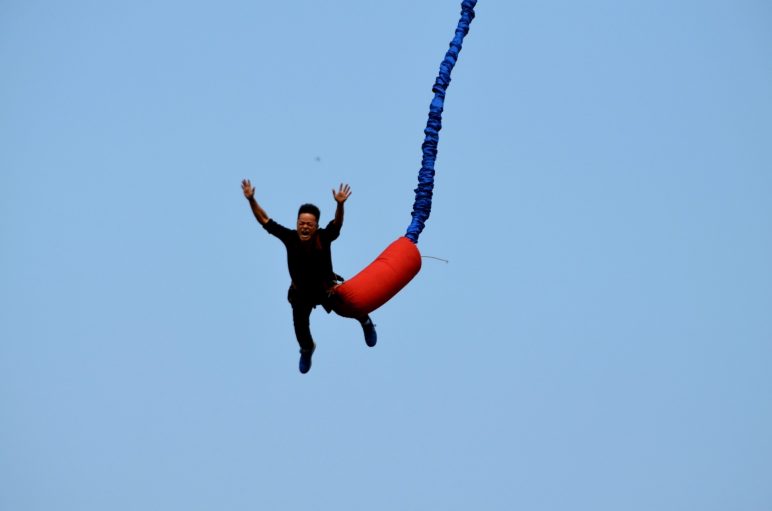The “elastic band” reaction to change is becoming apparent
It seemed like a good idea at the time: take the first three months of 2020 “out” on a project whose full-time, full-on nature didn’t allow much time for writing or video work, come back and resume my regular posting of ideas on change and related topics.
This all went swimmingly… until coronavirus happened. First impression was that all would be OK. I simply stopped travelling to the client’s site and completed the last two weeks of the project remotely, with technology – and the client’s own nimble action in organising remote participation – helping immensely.
When I resurfaced at the beginning of April, I plunged back into my other activities: working with a small number of non-profit organisations, setting up future opportunities and setting myself some lockdown learning objectives. (As one of my colleagues put it – quoting Barack Obama’s Chief of Staff, Rahm Emmanuel – “you can’t let a serious crisis go to waste.”)
But amidst all this activity – not to mention my new daily exercise hour to make up for the lack of commuting and the closure of my local gym – I began to find that things were slowing down, and my productivity was taking a hit.
What was going on?
Elastic
I was experiencing something that I have noticed affecting people on a personal and organisational level. I call it elastic band syndrome and it’s common to many situations where significant change happens in a short space of time.
There’s a commonplace complaint in almost all organisations that I have worked with that “people resist change”. They do, but when circumstances are right people will be very good at adapting to change. It’s been happening everywhere since mid- to end-March and I’ve personally seen this in some different areas:
- My most recent client turned their front and back office operations over to remote working in a very short period of time.
- The NCT moved its ante-natal classes onto Zoom in the space of around a week, turning its ante-natal teachers into online videoconferencing experts. (My wife runs classes and is now the resident expert on facilitating online meetings.)
- Socially, all kinds of groups have moved online and the phenomena of remote drinks, dinner parties and coffee mornings are now commonplace.
And, since visiting them is not currently possible, my in-laws (aged 87 and 94) are becoming adept at video calls with us… it’s all good but…
Stretch goals
…whilst changing working practices, making difficult decisions about furloughing staff or adapting to being furloughed can be – and has been – done in a very short space in time, it’s literally a stretch to do so and the effect is like stretching an elastic band – the resistance of the band to being stretched will force a return to its original state. Maintaining the stretch over a long period of time will eventually become exhausting.
Kindness
Symptoms of this can be visible on a personal level: I’ve had periods over the past few weeks where I find myself suddenly feeling quite low (not my normal state) or becoming very irritable. Whilst some of this can be attributed to late mid-life crisis or general grumpiness, I think it’s much more noticeable whilst there is a background of stress and uncertainty.
My first reaction to a period of locked-down home-based working: to fill my time with learning objectives, sales and marketing goals and so forth was perhaps understandable but of course added to my own stress level rather than providing motivation to power through the crisis.
I know I am not the first to say this but the lesson to take from this is simple: BE KIND – to yourself, colleagues and family.
Noise
So, simple lesson learned but there’s a bigger point for those involved in change management: we’re usually pretty good at assessing people’s readiness for change via surveys, focus groups and so for the but how often do we take into account the “background noise”, the context for the change.
In the case of coronavirus, the background noise is comparable to a neighbour playing loud music all day long (something mercifully absent in my immediate neighbourhood so I’m enjoying the traffic-free stillness while it lasts) when you’re trying to work. In that kind of environment your productivity will drop, and your focus will be on dealing with the noise, not the task in hand. Asking people to change their behaviour in a time of great stress is possible but likely to be a short-term response, not a permanent shift.
The lesson for change managers as we plan for the “next normal” (as McKinsey refer to it in some of their recent articles) is two-fold:
- Considerable imagination, innovation and experimentation will be required to ensure organisations survive into the post-pandemic era and this will require people to adopt and adapt to new working practices, but…
- The residue of stress from the pandemic will affect their ability – and energy – to change.
Plotting a course through the next few months and years will require sensitivity and insight to make sure the changes people are required to make have a lasting beneficial effect – on themselves and the organisations and customers they serve.

One thought on “Coronavirus and change: sensitivity required”